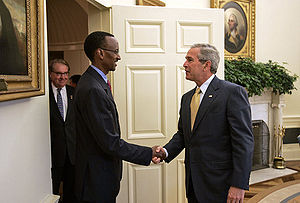 Image via Wikipedia
Image via WikipediaBy JOSH KRON and JEFFREY GETTLEMAN
KAMPALA (NEW YORK TIMES), Uganda — The British police have warned two outspoken Rwandan dissidents living in London that their lives are in danger because the Rwandan government may be plotting to kill them, according to British officials and documents.
In hand-delivered letters dated May 12, the Metropolitan Police Service warned the dissidents that the threat on their lives “could come in any form” and that “unconventional means” had been used before.
“Reliable intelligence states that the Rwandan government poses an imminent threat to your life,” the warning letters read. They added, “Although the Metropolitan Police Service will take what steps it can to minimize the risk, the police cannot protect you from this threat on a day-by-day, hour-by-hour basis.”
British officials confirmed the documents’ authenticity on Thursday.
Human rights groups have increasingly criticized the Rwandan government as being repressive and intolerant of any dissent, and several Rwandan dissidents living abroad have been mysteriously killed.
Last year, a former Rwandan general who had broken with the government was shot in South Africa, and assailants later tried to kill him while he was recovering in the hospital. Western diplomats contended that was evidence of a government plot to kill him.
The Rwandan government has rejected such accusations, including any threats in London.
“The government of Rwanda does not threaten the lives of its citizens wherever they live,” it said in a statement. “The Metropolitan Police have not approached us with evidence of allegations, but we are ready, as always, to work with them to ensure that nobody, be they Rwandan or not, is the victim of violence on British soil.”
The form letters, signed by a member of the Metropolitan Police Service, did not vouch for the accuracy of the threat but said it came from a source whose account the police had “no reason to disbelieve.”
One of the recipients of the warning, Rene Claudel Mugenzi, has been actively working with Rwandan opposition groups in London and said he was contacted by the British police late on May 12. “They said it was important,” Mr. Mugenzi said, “that I should not leave home.”
Mr. Mugenzi, 35, said he was aware that the Rwandan government did not appreciate his political views. But when two police officers showed up at his door in east London around 10:30 p.m. and told him and his wife of a threat to his life, he said he was speechless.
“I did not think they could think to kill me here in the U.K.,” he said.
Mr. Mugenzi says that in March he asked a pointed question to Rwanda’s president, Paul Kagame, during a BBC call-in show about whether Mr. Kagame believed an Egypt-style revolution could happen in Rwanda.
He also helped organize a recent meeting of exiled Rwandans in London. The Rwandan government has accused many opposition officials of working with a rebel group in eastern Congo that has been classified as a terrorist group by the United States and linked to the 1994 Rwandan genocide.
Mr. Mugenzi, who says he holds British as well as Rwandan citizenship, also works as a director at the London Center for Social Impact. He ran with the Liberal Democrats in local London elections last year and lost.
He has been living in Britain since 1997 and has frequently criticized Rwanda’s government for rights abuses.
“Take such remedial action as you see fit to increase your own safety measures, e.g. house burglar alarms, change of daily routines, always walk with an associate,” said the warning letter. “It may even be that you decide that it is more appropriate for you to leave the area for the foreseeable future.”
He said he had no plans to leave, but he was not ruling it out.
The other recipient of the warning, Jonathan Musonera, said he was a former Rwandan Army captain who fled to Britain in 2001 after defecting while the army was fighting in Congo. He said he was subsequently tortured by the Rwandan government. Now a critic of the government, he said the British police visited his home about an hour before the visit to Mr. Mugenzi.
“They told me about the Rwandan government,” Mr. Musonera said, “that they put my life in danger and they were trying to kill me.”
Critics of the Rwandan government have been killed or have simply vanished. Seth Sendashonga, a former member of the governing party, was fatally shot in Kenya in 1998. Augustin Cyiza, a former vice president of Rwanda’s Supreme Court, disappeared and is believed to have been killed in 2003. Leonard Hitimana, an opposition politician, disappeared the same year.
A Rwandan journalist covering the apparent assassination attempt of the general in South Africa was shot dead the day his story was published. The shooting strained relations between South Africa and Rwanda, with South Africa recalling its ambassador in August.
Last month, The Independent, a British newspaper, reported that Britain’s domestic intelligence service, MI5, had warned Rwanda’s high commissioner in London that a harassment campaign against Rwandan dissidents must be stopped or more than $100 million in foreign aid to Rwanda could be cut.
The Rwandan government has repeatedly denied that it represses its citizens or has had a hand in any of the attacks on high-profile dissidents.


No comments:
Post a Comment